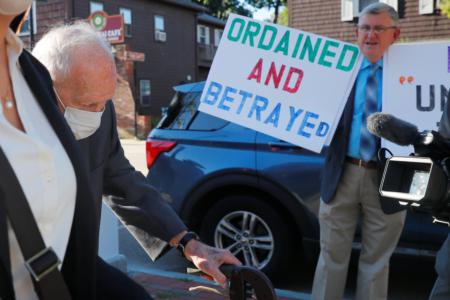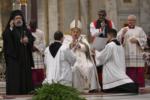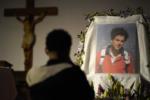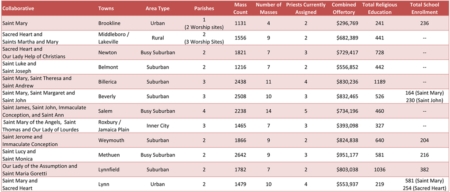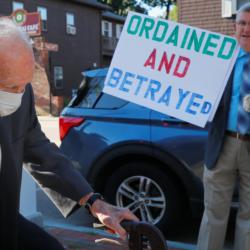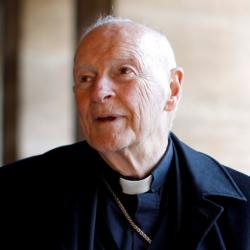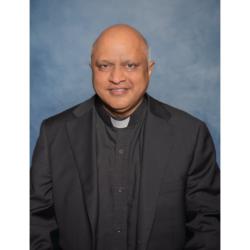Archdiocese rolls out first phase of new pastoral plan
BRAINTREE -- The Archdiocese of Boston was to announce Jan. 10 the first parishes grouped under the new pastoral plan in what the archdiocese calls phase one collaboratives.
In phase one implementation of the plan, "Disciples in Mission: A Pastoral Plan for the Archdiocese of Boston," 28 parishes in Belmont, Beverly, Billerica, Brookline, Jamaica Plain, Lakeville, Lynn, Lynnfield, Methuen, Middleboro, Newton, Roxbury, Salem, and Weymouth will be combined into 12 collaboratives. The plan calls for these collaboratives to share common pastors, pastoral teams, parish staffs, parish finance councils and pastoral councils.
Father Paul Soper, director of the Office of Pastoral Planning, said even though this is to be the first step in the archdiocesan plan to organize its 288 parishes into approximately 135 parish collaboratives "the first thing people need to know, and always remember about the pastoral plan itself is that it is about evangelization."
"Any restructuring that is involved in this is toward the end-goal of evangelization, because parish-based evangelization works, but we need strong parishes in which to do parish-based evangelization," he said.
The archdiocese will assign pastors to the announced collaboratives by April, train the pastors in May and June, and inaugurate collaboratives participating in the first phase in July. Father Soper said he anticipates his office to begin work on phase two in 2014, which should result in around 50 collaboratives.
Bishop Robert P. Deeley, vicar general and moderator of the curia, said this first step in implementation realizes the potential of a plan created with feedback from consultations throughout the archdiocese for more than 18 months by the Archdiocesan Pastoral Planning Commission, under the leadership of co-chairs Msgr. William Fay and Deacon Chuck Clough.
He said the collaborative structure will help direct resources toward keeping parishes as places where sacraments can be celebrated and the Gospel can be proclaimed, an emphasis stressed by Cardinal Seán P. O'Malley.
"It is a time, for me, of great hope. We are confronted, as we know, with issues and problems concerning how we staff our parishes and how we finance them, and yet we know that the parish is the center of our reality and the place in which evangelization is going to take place. So, this plan to strengthen them is a real positive sign of our trust that we can move forward in a way in which we use our resources in the best possible way to do the work which we are called to do as a Church," Bishop Deeley said.
"We are grateful for what has come before in all the studying, but now it is a question of putting into action what has been proposed. That is going to be an exciting and hope-filled time for us here in the archdiocese," he said.
"Phase one is a real opportunity to test, to try, to probe, to find the best ways forward. The cardinal has emphasized all through this that the plan has to be flexible. It has to deal with issues as it confronts them, and that is certainly what we are doing here," he said.
Father Soper said the first phase will be conducted as a test of sorts, uncovering potential obstacles and creating models for best practices.
"Then I would say that what people need to know most importantly about phase one is that it is a sandbox phase, it is a beta test," he said.
Father Soper said more than the necessary number of parishes to create 12 collaboratives volunteered to enter the collaborative model in phase one. However, instead of starting with only volunteers, officials chose parishes that reflected a diversity of issues faced at a parish level in the archdiocese to test the plan.
"We chose these collaboratives specifically because we believe these are places in which we can give the pastoral plan a test and see how it will work out. We know that there are a number of concepts within the pastoral plan that need further development, and we believe that these are collaboratives within which that development can happen," Father Soper said.
Father Soper said this testing should occur in a varied set of circumstances on the parish level.
"That is why we chose collaboratives spread out across the regions of the diocese, why we chose collaboratives with markedly different demographics, why we chose collaboratives representing all of the numerical combinations that the final list of collaboratives of the 135 will contain," he said.
The consideration of these and other factors lead to the selection of the phase one collaboratives according to Father Soper.
"We think that these 12 collaboratives are well positioned to give us a really good test drive for this," he said.
One of the issues in implementing the plan will be the number of parishes in a collaborative. Father Soper said though most collaborative groups will contain two or three parishes some will contain four, and some parishes will stand as a single collaborative -- like St. Mary in Brookline, a single proposed collaborative with two worship sites.
Another potential issue comes in collaboratives where parishes provide Masses in multiple languages.
"For instance the Salem collaborative, the parishes of that collaborative will have to have Masses in English, Spanish and Polish," Father Soper said.
A primary concern voiced in past months by officials working on the new pastoral plan has been choosing the right priests to serve as pastors according to the needs of each collaborative, such as the specific need of the collaborative in Salem.
"The pastor is going to have to be somebody who can not necessarily speak those languages, but who can work with people who speak those languages," Father Soper said.
According to materials provided to The Pilot, the first phase collaboratives will include parishes in the inner-city such as Roxbury and Jamaica Plain, urban parishes in Lynn and Brookline, as well as suburban parishes in Belmont, and rural parishes in Middleboro and Lakeville.
Collaboratives will also contain Catholic schools in some cases.
Half of the 12 announced collaboratives have one school as part of the collaborative, and two of the collaboratives have two schools.
"We had a particular interest in seeing how a various mixture of schools was going to work, and we see that represented in this instance," Father Soper said.
Father Soper said the website of Disciples in Mission will provide information regarding the implementation of the pastoral plan as it progresses. At www.disciplesinmission.com under the tab labeled "Phase 1" the office will publish updated information as the plan unfolds and implementation develops.
"The purpose of this is to keep the process open and transparent, so everybody can see all the information," Father Soper said.
Father Soper said parishes will remain distinct communities as part of each collaborative.
He said there will be no new bank accounts, canonical entities, or structures between parishes and the archdiocese.
"The pastors are not being assigned to a collaborative, they are being assigned to the parishes of the collaborative," he said.
St. Mary of the Assumption Parish in Brookline will pair as one collaborative with two worship sites.
Sacred Heart Parish in Middleboro with Sts. Martha and Mary Parish in Lakeville will form one collaborative with three worship sites.
The plan will create collaboratives by pairing Sacred Heart Parish with Our Lady Help of Christians Parish, both in Newton, St. Luke Parish with St. Joseph Parish, both in Belmont, St. Jerome Parish with Immaculate Conception Parish, both in Weymouth, St. Lucy Parish with St. Monica Parish, both in Methuen, Our Lady of the Assumption Parish with St. Maria Goretti Parish, both in Lynnfield, and St. Mary Parish with Sacred Heart Parish, both in Lynn.
St. Mary Parish, St. Theresa of Lisieux, and St. Andrew Parish, all in Billerica, will form one collaborative. St. Mary Star of the Sea Parish, St. Margaret Parish, and St. John the Evangelist, all in Beverly, will join one collaborative. St. Mary of the Angels in Roxbury and St. Thomas Aquinas Parish and Our Lady of Lourdes in Jamaica Plain will join one collaborative.
St. James Parish, St. John the Baptist Parish, Immaculate Conception Parish, and St. Anne, all in Salem, will join together in one collaborative of four parishes.
Bishop Deeley reiterated that he sees the initiative as a moment of hope.
"It is also a moment of invitation to the whole archdiocese. These are the parishes where we are going to start, but the kinds of things that we are going to be doing, the collaboration that we are encouraging, and the evangelization that is at the heart of this is really the work of the Church, and so therefore though this begins for a certain number of parishes in the diocese we hope that this would be a moment in which all of the parishes, particularly as the collaboratives are named, will begin to seek ways in which they can work together to accomplish the goals which are part of what we are about," the bishop said.
